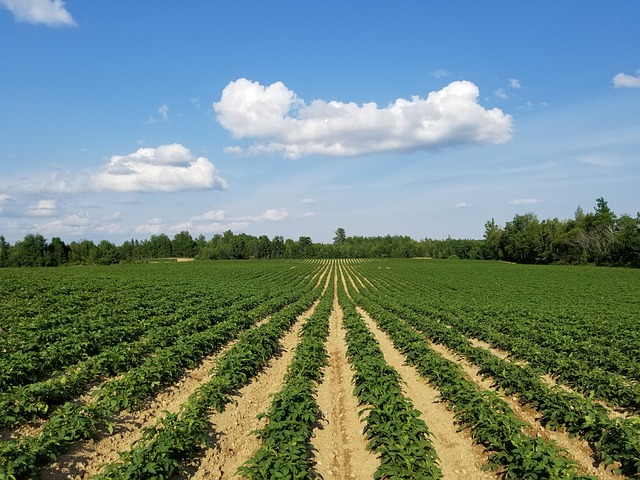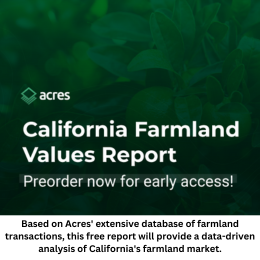March 11, 2024
By Michelle Pelletier Marshall, Global AgInvesting Media
You’ve joined GAI News on the “Three Questions With…” journey before. Today, we expand beyond agtech in our coverage to showcase the movers and shakers in ag investing.
As with our first “Three Questions With…” we will provide a quick peek inside some of the sectors’ most creative and forward-thinking investors who are funding disruptive technologies and new platforms, providing the bridge to build the future of food and ag.
For today’s feature, we talked to Rob Appleby, founder and CIO of Cibus Capital LLP (“Cibus”) of London. The firm advises on investments in sustainable food and agriculture, channeling capital towards companies that are charting the future of food. Using innovative technology to disrupt food production, they aim to increase resource efficiency and ensure sustainability in their investments. This is evidenced by acquisitions of the likes of Innoliva, one of the world’s largest extra virgin olive oil producers; or the UK’s cell-grown tree producer Alba Trees; or by participating in the raise of US$42 million for precision pollination platform BeeHero.
We asked Appleby, who has invested in private capital across the globe for 25 years, to respond to the following:
1). Tell us about your company.
Cibus (the Latin word for ‘food’) was launched in 2016. Its genesis was driven by real life observations of the changes taking place in food and farming. As a farmer, I was disturbed by the fact that farmers are both the cause and the victims of climate change. What seemed less obvious was that unless capital was provided to encourage behavioral change, farms would become stranded assets and farmers would go out of business. I also was personally motivated to fill the knowledge gap that exists between consumers and producers.
Cibus was started as a sustainable food and agriculture platform, which exists to channel capital towards people who are charting the future of food. That future belongs to those who are doing things better by embracing technology, being smarter around resource use, and providing consumers with sufficient calories at the right price.
As a European-based firm, we felt Cibus had a license to operate in certain areas of the agriculture and food value chain – namely in sectors that demonstrate strong and continued growth (examples include indoor farming or perennial crops); in smaller enterprises where access to capital has historically been difficult; and in those organizations with a service to provide farmers that will dramatically alter the way they operate (technology solutions).
More recently, the discussion has centered on how farmers and landowners can be rewarded correctly for providing food and by doing right by the environment and interrogating the agriculture/natural capital nexus.
We consider that sustainability and commercial prosperity are inextricably linked in our targeted sectors. The growing tailwinds to our thesis, whether regulatory, consumer demand, or changing planetary conditions, have further accelerated the momentum behind the Cibus strategy.
2). How will your investment strategy bring about positive changes in the sector?
Let me answer this with an example.
Many farmers use glyphosate (often branded as ‘Roundup’) ubiquitously as a weed killer (but also to dry wheat before it is harvested or to kill a grass sward before replanting). As with other chemical inputs, the price of glyphosate has risen about 300 percent in the last two years, making blanket spraying completely unaffordable. A Swiss company, Ecorobotix, has developed a system that hooks up to the back of a tractor that uses sophisticated cameras linked to AI software that can accurately identify weeds from a crop. Coupled with sophisticated spray nozzles, the farmer can ‘spot’ spray pernicious weeds and reduce chemical applications by up to 92 percent. The savings to the farmer are such that, depending on the crop and the use rate, the machine pays for itself in 12-36 months. The farmer is using less fossil-fuel derived inputs (thought to be the cause of significant GHG emissions) and making higher margin by adopting this form of technology.
We have made 34 such investments that are intentionally designed to reduce the production of ‘fossil food’, reward farmers appropriately, and provide sustainable outcomes.
3). What does “the future of ag” mean to you/Cibus, and what do you see as the most opportune investment for disruption in the sector?
One of the biggest challenges for agriculture across the world is the availability and cost of labor. In my country, the UK, we rely heavily on seasonal agricultural workers to harvest fruits and vegetables and pack them for the retailers. After Brexit, these workers have not been granted entry into the country in the numbers previously experienced and the cost of labor has risen faster than inflation. This, at the same time of a cost-of-living crisis where retailers are forcing prices down, has meant that farmers and growers need to find a solution.
That solution has come in the form of robots.
It is a poorly kept secret that Cibus has investments in over five robotics companies, one of which is a Dutch indoor robot company called ISO Horti. ISO manufactures machines that pick, pack, sort, weigh and even graft vegetables. These low touch, repetitive tasks are being done very efficiently and robots are becoming invaluable support to growers. The human workforce displaced by machines are being trained and upskilled to be robot operators and technicians.
Agricultural robots are likely to feature prominently in our vision of the future in this industry.
– Michelle Pelletier Marshall is contributing editor and author for HighQuest Partners’ GAI News and Unconventional Ag, and managing editor for its WIA Today blog. Additionally, she is the company’s Senior PR/Media Manager. She can be reached at marshall@highquestpartners.com.
*The content put forth by Global AgInvesting News and its parent company HighQuest Partners is intended to be used and must be used for informational purposes only. All information or other material herein is not to be construed as legal, tax, investment, financial, or other advice. Global AgInvesting and HighQuest Partners are not a fiduciary in any manner, and the reader assumes the sole responsibility of evaluating the merits and risks associated with the use of any information or other content on this site.

Let GAI News inform your engagement in the agriculture sector.
GAI News provides crucial and timely news and insight to help you stay ahead of critical agricultural trends through free delivery of two weekly newsletters, Ag Investing Weekly and AgTech Intel.




